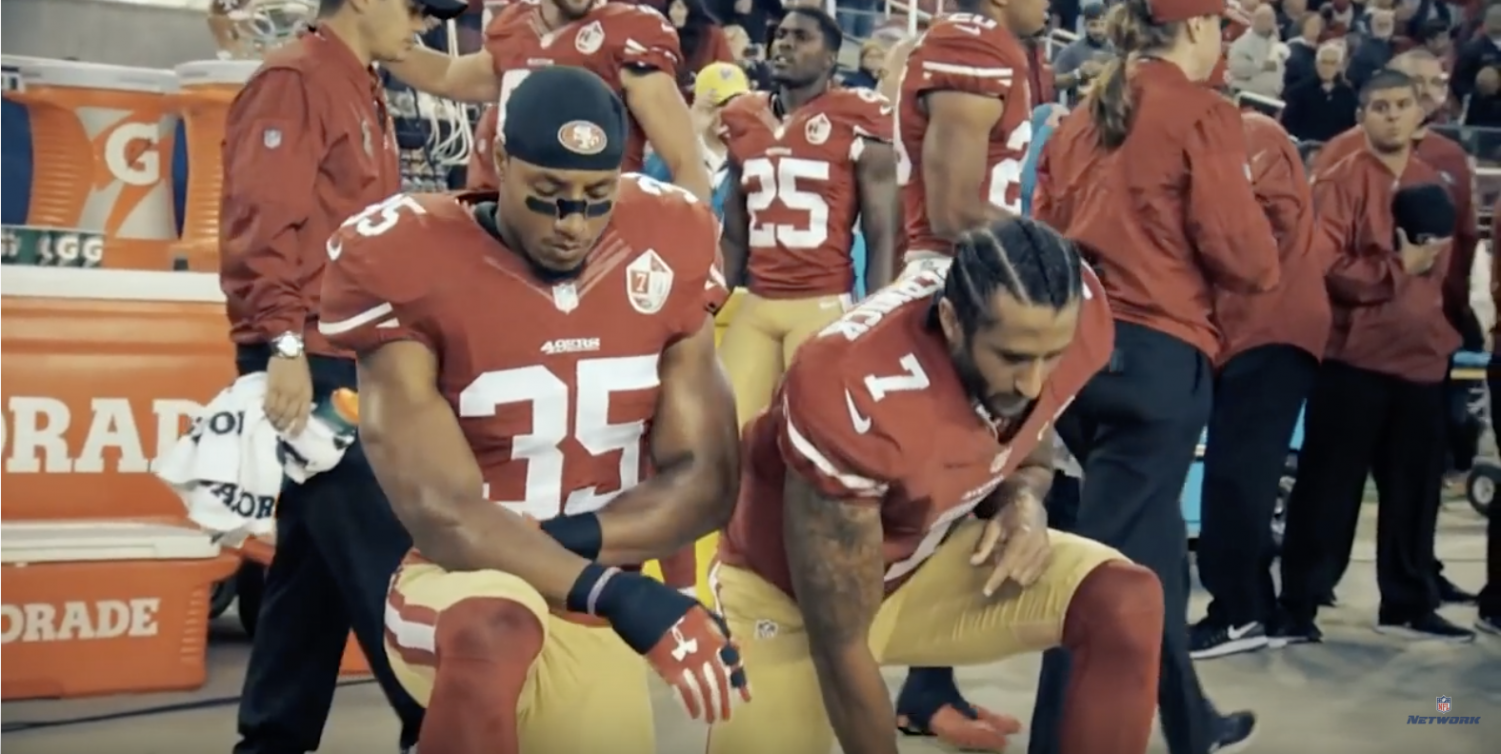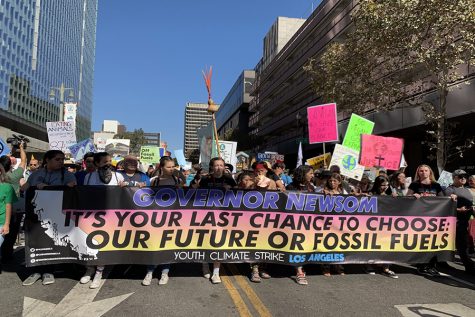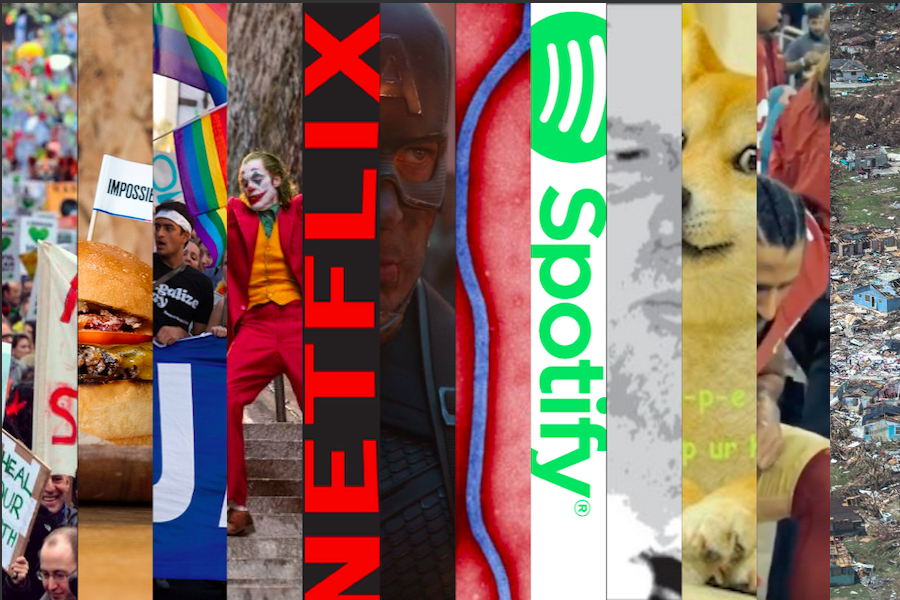10 stories that shaped the 2010’s
December 31, 2019
As a disclaimer, I was only eight years old at the onset of the 2010’s and live in America, so there is a degree of bias in my selections. But I try to keep well-informed, and embarked on some retrospective research to try and make a list as accurate as possible.
So without further ado, I present to you the movements, natural phenomena and pop-culture trends of the 2010s that defined the past 10 years, and will likely continue to affect, influence, inform and entertain us into the future.
Your additions and comments are strongly encouraged, through an embedded poll and the Comments section at the end of the article.
1. Memes arrive to make the internet definitively weird
Crying Jordan, Distracted Boyfriend, Galaxy Brain, and Doge are just some of the internet memes that have evolved throughout the decade into Gen Z’s primary form of humor.

Hard to explain to someone who has not seen one, these image-text combos started off as simple pictures, often of cats, with text on the top and bottom, and are now a sort of fill-in-the-blank image template that can be created to add any text.
Use of memes can range from jokes to comments on political issues.
Even some videos like this one (haha you just got rickrolled in 2019) or GIFS, like clapping Shia Labeouf can be considered memes.
Memes can be found on most social media platforms, including Instagram, Twitter and Reddit. Some memes have had long lifespans, while others live like a supernova — nearly everywhere for a few weeks and soon dead, often overused.
What is so unique about memes compared to other trends is that they are not controlled by a company or individual, despite however much that company or individual might want to. Instead they are a product of the collaborative nature of the internet. Whereas if Youtube wanted to get rid of the idea of a Youtube video, they easily could, no one can pull the plug on memes. Individual memes rise from obscurity, go through countless variations and then fade away, but the overall idea of “the meme” is just the natural outcome of a web of connected users all over the world, each playing their part in an online phenomena.
A charming moment in the despair that is everything else that occurs on the internet, memes represent what the internet was originally intended to do — connect creators around the world in the most collaborative space in history, albeit even if they didn’t envision baby Yoda.
Memes represent the weird yet charming humor that has become the new norm, and are one of the most interesting outgrowths of internet culture. Expect to see them continue to grow into the 2020’s.
2. Netflix and Spotify bring all of entertainment to your couch

Gone are the days of having to choose an album or song to buy or waiting every week for a new episode of your favorite TV show. The 2010’s marked a new era of convenient entertainment.
For $10 a month, subscribers to Apple Music or Spotify Premium can have access to the entire musical catalog ad-free on any device. This is a complete change from 20 years ago, when someone would have to buy a full physical album to listen to their favorite songs, or 10 years ago, when songs had be individually purchased on services like iTunes or pirated from websites like Limewire or Napster. While pirate sites are still alive and well, the more honest streaming services are much more popular at the moment.
This universal access has led to the discovery of streaming darlings such as Billy Eilish and Lil Nas X. But the demise of record sales also means that until they are discovered, they earn almost no money off online streams.

On the TV side, House of Cards, released in 2013, marked Netflix’s first foray into original content. The series’ first season was released all at once, vastly different from the traditional one-episode-per-week style. By now, “binge-watching” has entered the lexicon. Full seasons of original series from Netflix, Hulu and Amazon Prime video are available to be devoured to your heart’s — and your schedule’s — content.
HBO has still not given in to bingeing and newly released Disney+ and Apple TV+ are releasing their biggest series on a weekly basis. But they seem like outliers; time will tell whether they succeed, but streaming and binge-watching are here to stay.
3. The public finally listens to sexual assault victims
For years, beloved comedian and actor Bill Cosby had been accused of sexual assault and inappropriate and unwanted contact. But in 2014, comedian Hannibal Buress included jokes about Cosby’s behavior in his routine, and more women began coming out with accusations and bringing Cosby’s conduct to the public eye. Cosby was eventually tried, found guilty and sentenced to three to 10 years in prison.

In 2017, actress Ashley Judd accused Hollywood producer Harvey Weinstein of sexual assault. More than 100 other women eventually came forward with similar accusations against him, and in doing so unleashed a movement giving voice to the previously unspoken normative behavior of sexual harassment.
It started in Hollywood. As allegations against Weinstein surfaced, actress Alyssa Milano tweeted an encouragement for people to share their stories of sexual assault. Her tweet ultimately birthed the #MeToo hashtag, prompting hundreds of people to publicly bring allegations against powerful men.
Many have faced consequences, including Today Show host Matt Lauer, actor Kevin Spacey, US Senator Al Franken, Team USA Gymnastics Coach Larry Nassar, political commentator Bill O’Reilly and many many more, not all of them in the public eye. All lost their positions.
However, many men who have had credible accusations against them have faced little to no consequences besides a brief social media backlash. Chief among them have been Donald Trump, who was elected president in 2016 in spite of 25 allegations of sexual assault against him and having bragged about sexual assault on the Access Hollywood tape, and Supreme Court Justice Brett Kavanugh, whose nomination was approved in spite of nationally televised testimony by Christine Blasey-Ford, who alleged that Kavanugh assaulted her while in high school. Others returned from absences to something resembling their previous status, among them comedians Louis CK and Aziz Ansari and actor James Franco.
The future will determine how effective this movement will have been in the long run, but at the very least, the public appears to be much more aware of the presence of sexual assault in the entertainment industry and in everyday life.
4. Colin Kaepernick stands up to racial injustice by kneeling
In a 2016 preseason game, San Francisco 49ers Quarterback Colin Kaepernick sat, rather than standing, during the national anthem, as a protest against racial injustice and police brutality — an action which soon became the most divisive sports moment of the decade.

Kaepernick continued his protest, later kneeling, for the entire season and was joined by several other players.
Their protest was met with both praise and criticism, the latter which primarily argued that kneeling during the anthem was disrespectful to members of the US military and veterans. At a rally in 2017, President Trump called for owners to “fire” any player who knelt during the anthem. This prompted over 200 players to kneel the following weekend.
Kaepernick has been unemployed for the past three years — which he alleges is due to collusion by NFL owners, who in turn say he is simply not worth a roster spot (although they settled a collusion lawsuit for $10 million for Kaepernick and fellow player and protester Eric Reid). But he has been credited with inspiring other athletes such as Lebron James and Megan Rapinoe to speak out on social issues, and also with helping bring the topic of police brutality to the national conversation.
5. The world makes an effort to stop global warming, even where government leaders won’t
One-hundred-ninety-six countries came together in Paris in 2016 to draft the first ever global agreement to reduce carbon emissions, aiming to curb global warming.

However, while the agreement was a hopeful sign of motivation for global leaders to act, the effort was not broadly sustained. Overall progression toward goals stated in the agreement was mixed. And in 2017, President Trump announced his intention to withdraw from the non-binding agreement. Secretary of State Mike Pompeo says the withdrawal would become on Nov. 4, 2020 — the day after Election Day.
Two years after the Paris agreement, that initial hope has been reignited by youth activists, led by Swedish teen Greta Thunberg. In September of this year, Ms. Thunberg called for a global youth “strike” demanding action be taken by governments around the world. Protests were held on every continent, with organizers estimating that 4 million people took part — which would make it the largest climate action in history.
This grassroots activism offered a sliver of hope that world leaders might be influenced to take real action in the 2020’s.
6. A virus outbreak kills thousands, causing global panic
The 2010’s marked the AIDS virus becoming curable, although only two patients have been fully cured so far — still, a massive step for one of the deadliest pandemics in history.

However, in 2013, an outbreak of the Ebola virus, an often fatal illness spread by contact with bodily fluids, was first reported in Guinea and quickly spread throughout West Africa.
The disease spread out of Africa to isolated cases in Spain, the U.K. and the U.S. and began to cause widespread panic.
When the epidemic was declared over in 2016, the U.S. Centers for Disease Control said it had been the largest Ebola event in history, having infected 28,616 and killed 11,310.
While this outbreak was not close to the deadliest or most widespread disease event ever, it served as a warning that even though medicine has greatly improved, there is still potential for a global outbreak.
And the reaction of panic around the world even in countries where there were no reported cases foreshadowed the extent of panic should a more quickly spreading, uncontrollable outbreak occur
7. Same-sex marriage is legalized in 18 countries; LGBT rights are still meager worldwide
The 2010s were a groundbreaking decade for LGBT rights around the world. Same-sex marriage was legalized in 18 countries including the U.S., U.K., Brazil, Germany and Australia, joining seven other countries including South Africa and Canada where it became legal in the 2000s.

But the vast majority of the world still does not allow same-sex marriage, and in 71 U.N nations, being gay is still illegal and in six it is punishable by death.
Meanwhile, while the recognition of transgender people has become more common as well, and many countries have introduced legislation attempting to prevent discrimination against them. But the global stigma against transgender and non-binary people is as present as ever, even in the U.S. In 2017, President Trump announced a ban against transgender people serving in the military on Twitter which was instituted in 2019 after a series of court battles.
Since 2008, the Trans Murder Monitoring project has reported 3,314 known murders of transgender and gender-diverse people worldwide, an average of 301 per year that is rising; there were 331 between October 2018 and September of 2019, the report states.
The next decade may continue the trend of global acceptance of LGBT people, but it is a slow march and many people will likely continue to suffer and even be killed.
8. Volatile natural disasters are exacerbated by rising global temperatures.
The signs of severe global warming became ever more present in the 2010s. The CO2 level in the atmosphere continued to climb, continuously setting records as arctic glaciers melted increasingly rapidly.

Among the signs were an epidemic of severe natural disasters, which scientists believe are being exacerbated by global warming. Increased temperatures can lead to longer drought periods, which can also lead to fires. And the high amount of water vapor absorbed by the atmosphere during these hot periods can lead to intense storms and flooding.
Increased ocean temperatures can result in more tropical storms. Hurricanes Irma and Maria (2017), Michael (2018) and Dorian (2019) devastated the Caribbean and southeastern U.S., were examples of that potential for destruction.
Severe droughts in East Africa left millions facing food shortages and starvation. In California and Australia, droughts resulted in dry conditions ideal and led to massive forest and bush fires.
Southeast Asia saw record flooding and monsoons, disrupting the economic activity and lifestyle of those in the region.
As the decade ended, these events seemed to be only getting worse and it seemed likely that certain areas would become uninhabitable, further adding to the 70.8 million forcibly displaced people in the world. Even with efforts to slow global warming, but these natural disasters are likely going to become the new norm.
9. Comic book adaptations put a stranglehold on the box office

Tell someone 20 years ago that four of the 10 highest grossing films of all time would be adaptations of comic books and they would have been shocked. But in the 2010’s, that is just what happened.
Starting in 2008 but truly taking off with 2012’s The Avengers, Marvel Studios took a comic book superhero team that was popular yet not nearly on the level of giants like Batman, Superman or Spiderman, and one by one turned them into the most recognizable fictional characters on planet earth.

After releasing 18 interconnected films with different Marvel characters, including the critically acclaimed Black Panther, the company released arguably the biggest cinematic event in history with Avengers: Infinity War in 2018. The film ended on a cliffhanger lasting a year and, with two more movies sandwiched in between, culminated in 2019’s Avengers: Endgame — the highest grossing film of all time.
Rival company DC Comics has mostly been unable to reproduce that success in its film adaptations this decade, with Justice League and Suicide Squad being spectacular critical and commercial flops. However, 2019’s Joker, a dark, Scorsese-style origin story of the “clown prince of crime,” just this month became the highest grossing R-rated movie of all time and is expected to be an Oscar contender in February..
The comic book behemoths are only beginning. With a list of movies and TV shows lined up for the foreseeable future, nerd culture is the new mainstream.
10. Fast food goes “plant-based”
The Impossible Whopper and Beyond Taco seem like sci-fi creations. But if you went to your local fast food restaurant in 2019, chances are you would find some fake meat on the menu.

Not exactly the beginning of a vegan takeover, these “plant-based” meat alternatives were marketed mainly at meat-eaters who wanted to be more environmentally conscious. A 2017 University of Michigan study of the Beyond Burger concluded that producing it consumed “90% less greenhouse gas emissions and requires 46% less energy, 99% less water and 93% less land, compared to a quarter-pound of U.S. beef.”
In 2019, the U.S.’s two main meat substitute competitors, Beyond Meat and Impossible Foods — both kosher, by the way — began to sell a variety of products including burgers, sausages and ground beef. Their products can be found at major chains including Burger King, White Castle, Red Robin, Carl’s Jr., Taco Bell, A&W and more.
They are also continuing to expand to more chains, and now can be found in some kosher restaurants including LA’s Pat’s and the more down-scale Melrose Bite.
What made their creations different from your classic black bean burger or tofu dog was that they tasted and had a texture remarkably close to that of meat — the result of a complicated synthetic process which ultimately yields a product that, according to nutritionists, is not much, if at all, healthier than actual beef.
Still, for meat-eaters and abstainers alike, a tasty alternative to meat is the best way to wean the public off of meat, which scientists say is bad for the environment. Maybe in 2029, the “animal-based” burger will be the rarity at Burger King.
If there’s something I didn’t mention that you’d like to add, please comment below.
I don’t know what will come next but if I had to guess, I’d predict virtual reality, artificial intelligence and a climate refugee crisis are three strong yet depressing candidates for what the 2020’s will bring.
But there’s no need to worry about the future. For now, enjoy the present and try to appreciate the moments that you will look back on Dec. 31, 2029. Happy New Year.
